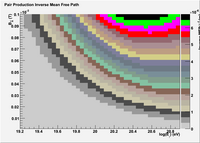Since my last post on building ROOT packages for Ubuntu the resourceful Christian Holm Christensen has got the unofficial Debian/Ubuntu ROOT repository back online. One problem is that due to a dh_python bug in Ubuntu, the libroot-python-dev package (required for PyROOT) is broken for Gutsy (and probably Feisty too), since it depends on python < 2.5. I’ve hacked the ‘control’ file to remove that broken dependency and repacked the .deb file to make a package that is installable and doesn’t break apt.
Download it here:
libroot-python-dev_5.17.05-3-quickfix_i386.deb
Steps to create this:
- Get the libroot-python-dev package from the repository
wget http://mirror.phy.bnl.gov/debian-root/...
ubuntu/pool/main/r/root-system/libroot-python-dev_5.17.05-3_i386.deb
- Unpack the .deb
ar -x libroot-python-dev_5.17.05-3_i386.deb
- Unpack the control data:
tar -zxf control.tar.gz
- Edit the file ‘control’ to fix the dependencies and bump the version number
- Repack control data:
tar -zcf control.tar.gz control md5sums postinst prerm
- Repack the .deb
ar -r libroot-python-dev_5.17.05-3-quickfix_i386.deb debian-binary control.tar.gz data.tar.gz
I hope to help fix the underlying issue soon but right I’ve got a ton of thesis-related work to plough through so this band-aid will have to do for now.
Update 2007-12-11:
I spent a morning last week tracking down this ROOT Python bug. Turns out there was a file not being deleted during the ‘clean’ stage of the debian package creation which led to a dependency confusion with python versions. New source packages have been uploaded which fix this issue:
deb-src http://mirror.phy.bnl.gov/debian-root unstable main contrib
Binary packages should be up shortly.
Update 2009-03-02:
Noticed a typo in the re-tarring command, now fixed.
 Before
Before After
After